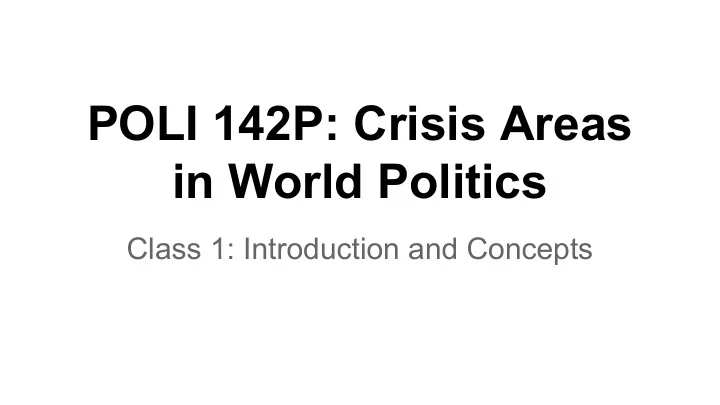

POLI 142P: Crisis Areas in World Politics Class 1: Introduction and Concepts
What is a crisis? “a condition of instability or danger, as in social, economic, political, or international affairs, leading to a decisive change.”
What is a crisis? Crisis Political International Crisis Crisis
We are concerned with international political crises Crisis Political International Crisis Crisis
What is an international political crisis?
What is an international political crisis? ● change in type or increase in intensity in disruptive interactions between two or more states that… ● destabilizes their relationship and challenges the status quo of the international system.
Evolves from foreign policy crisis in one country ● A country feels: ○ threat to one or more basic values. ○ finite time for response ○ heightened probability of involvement in military hostilities. ● Sufficient to escalate international dispute to potential for status quo change
International political crises are not... ● International conflicts. ○ Crises can occur without interstate hostilities. ● Non-conflict scenarios, such as refugee crises and natural disasters can become international political crises. ○ Term: externality crisis - caused by factors external to the actions of nation states.
History of International Crises ● 17th Century - Sovereignty matters. ● 18th Century - Succession Crises ● 19th Century - Revolts against monarchy ● 20th Century - World Wars, Cold War ● 21st Century - ???
17th Century - Westphalian System ● Sovereignty -- states are principal international political actors. ● Thirty Years’ War - supremacy of nation- states established, end of religious wars.
18th Century - Attempts at hegemony ● 1700 - War of Spanish Succession ● 1740 - War of Austrian Succession ● 1756 - Seven Years’ War
19th Century - Challenges to Monarchy ● Revolutionary and Napoleonic France upends status quo. ● 1848 - Middle class revolutions against absolute monarchy
20th Century - World Wars; Cold War ● Monarchies destroyed in World War I. ● Idea of state spread globally as colonialism ends. ● Cold War - Communism challenges capitalist order
21st Century - ???
21st Century - ??? ● Nothing as bad...but: ● Externality crises: climate change, refugees, financial, revolutionary. ● Regional crises: India - Pakistan, Saudi Arabia - Iran. ● Invasion/Aggression - US and Iraq, Russia and Ukraine, China.
Are international political crises a problem? Should we both trying to avoid them?
Are international political crises a problem? Should we both trying to avoid them? Take 1 : Crises can Take 2 : Crises are escalate to conflict, inevitable, necessary millions may die, to change international nuclear war may system. Prevention begin, bad for attempts have grave humanity. consequences.
How do states deal with crises?
How do states deal with crises? ● Initially, through military force. ● Ideological challenges led to the formation of institutions that acted together maintain status quo. ● After world wars, evolved into CSOs.
Congress of Vienna (1815) ● Response to Napoleonic Wars. ● European Monarchies joined to collectively maintain monarchy across Europe. ● Suppressed 1848 Revolution
Congress gives way to alliances and World War I
League of Nations (1920) ● Formed after World War I. ● Intended to: ○ Prevent wars of aggression. ○ Facilitate disarmament. ○ Create negotiated settlements to disputes.
League failed to prevent World War II ● Many countries either never joined or left League in 1930s. ● No political will to stop aggression. ● Negotiated settlements emboldened aggressive states
United Nations (1945) ● Attempted to fix mistakes of League of Nations. ● Intent to facilitate negotiation, act collectively against aggressors. ● Security Council makes military decisions.
Does the UN Work? ● Mostly: “no.” ● The UN has largely not resolved crises. ● Powerful countries do not abide by UN decisions.
Questions for the rest of the course ● Can formal international institutions resolve crises? If so, how and which crises? ● If collective security is not an effective tool, why hasn’t there been another World War? ● How can crises be resolved as they arise? Is it possible to avoid crisis altogether?
Recommend
More recommend